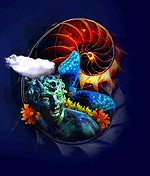|
|
The Pedestal Magazine -</i>Amy Uyematsu's <i>Stone Bow Prayer</i>...reviewed by JoSelle Vanderhooft
|
Amy Uyematsu's Stone Bow Prayer...reviewed by JoSelle Vanderhooft |
|
|
Stone Bow Prayer
Amy Uyematsu
Copper Canyon Press
ISBN Number: 1556592213
Reviewer: JoSelle Vanderhooft
Although the ancient Greeks saw many similarities between poetry and mathematics, it’s the rare calculus textbook today that quotes Carl Sandburg or Hilda Doolittle to explain integrals. Conversely, it’s unusual for poets to sprinkle their work with quotes from mathematicians. But this is exactly what Amy Uyematsu does in “The Invention of Mathematics," which she prefaces with these poignant words from German mathematics teacher Karl Weierstrass: “A man who is not somewhat of a poet can never be a mathematician".
These are words Uyematsu, herself a public school math teacher, takes to heart in Stone Bow Prayer, her third poetry collection. Many of the poems in this book focus on numbers in some way, either literally—a geometry student’s frustrations and an eleven year-old girl’s loneliness—or figuratively—the enigma of imaginary numbers, or the meaning of zero. And for the most part, Uyematsu uses her numbers in a way that best illuminates their inherent poetry and sublimity; to illuminate the inherent poetry and sublimity of aging, changing seasons, and love, which may well be the most complex calculus of all.
Uyematsu’s concern with numbers can easily be seen in Stone Bow Prayer’s structure. The book is divided into twelve sections, representing the twelve lunar months in the Chinese calendar (which Japan adopted in the 7th Century AD and used until the Gregorian system replaced it in 1873). Containing as few as three poems or as many as six, the twelve sections concern themselves with a certain theme, such as birth (Mutsuki/Month of Friendly Harmony), aging (Kisaragi/Month of Putting On More Clothes) or warfare (Kannatsuki/Godless Month). The poems in each “month," then, work much like a number set, which groups distinct elements considered as a hole in mathematical terminology.
Sometimes, poems in these “sets" feature mathematics explicitly, as does the aforementioned “The Invention of Mathematics." In this poem, Uyematsu examines the repeating patterns of numbers in human lives and relationships, beginning at birth:
/ one
one is the only true number
the I in the eye
each baby the god
in a mother’s sigh
and ending in a contemplation of human life juxtaposed against such incomprehensible things as the vastness of human history and the infinity of the cosmos:
/ the imaginary number i
my students don’t get the joke
after all, every number is imaginary
even those we count out
as beads and stones and miles to the sun
I tell them about some nameless
mathematicians who nobody paid
much attention to
always gazing at stars
these early oddballs and nerds
locked in their rooms
pondering pages of silly calculations
as if all life depended on them
until someone yelled i
let’s make up a new number
defined as the square root
of negative one
blasting open the infinite
which no one can see
able to chart arrow to bull’s eye
through windstorm and breeze
Other poems address mathematics in much more indirect or abstract terms. One of these, “Unfinished Calculations," is a collection of questions and epigrams that take the form of Zen Buddhist koans.
How true is the line that keeps threading its way through,
too thin to cipher and with no start or end
when did I first hear a voice that keeps humming in my ear
when does a kiss weigh more than a fist, the kiss outlast the scar
is forgiveness always less than the magnitude of rage
after so many days of walking, what roads does the foot remember
But not all of Stone Bow Prayer addresses mathematics so explicitly. At least one poem in each of the “months" focuses on the natural world’s beauty. Though most of these poems are longer meditations on such things as autumn, flowers, or stones (a central theme in the book), many of them are short, elegant impressions that owe much to the Japanese poetry forms of haiku and tanka. “Inside," based on a series of photographs from Rural Japan called Radiance of the Ordinary, is one of these. Following are two of the poem’s tanka-like stanzas:
/ afloat
Two boats with no riders
Still moving on water
The hulls barely touching
Each with a single oar
Safely propped
So it won’t fall
/ lotus leaves
Close into themselves
At night
On their wide folded backs
Water beads
Inside, their sleeping
flowers
But Stone Bow Prayer is far from being a collection concerned only with the abstract beauty of imaginary numbers and lotus leaves. Indeed, many of the book’s most successful pieces are those which leave math and nature in the background, and bring complex, lonely, and frequently ignored human subjects to the fore. One of these, “He Swears He Never Knew," discusses the pain and humiliation of an overweight, middle-aged man at the gym with profound sympathy and charity, and gentle humor.
...lately his eyes are his worst enemies
No longer hurtling into that hungry race for titillation
As he finds himself staring
At all recognizable shapes of the masculine
Back and forth from the tanned bared chests
To the sad, sagging torsos
Noticing for the first time in his life
Every old forgotten guy at the gym
These tragedies who quietly surround him
As if nothing at all is wrong with the picture
The unmistakable breasts hanging from the trim
Sixty-year-old swimmers to the fat-whiskered walruses,
Who some how sit naked and unbothered
In the sauna and locker room...
Uyematsu is also at her strongest when writing about her heritage as a Japanese-American. “The Fold" poignantly examines cultural prejudice against Asian women who have rounder eyes with “double lids" while “Flavor of the Month" is a hilarious response to a 2000 Newsweek article called “Why Asian Guys Are on a Roll," in which the poet wryly proclaims “Americans newest hunks are Asian." The most heartfelt of these poems is “Simple Division" (produced in its entirety), which, along with the proceeding “Desert Camouflage" is a sobering look at World War II’s Japanese-American internment caps.
My history echoes
from small diameters—
120,000 issei and nisei
divided among 7 states
equals 10 barbed-wired
desert prison camps.
Although a few of Uyematsu’s poems, such as the seemingly-experimental “Permutations" (another series of vignettes presumably about transformations) come across as a little too vague or theoretical, these poems are rare and may even strike some readers as interesting curiosities. In the end, Stone Bow Prayer is an excellent collection suited for lovers of the Zen aesthetic, the awkwardness and vulnerability in people, or for anyone who sees poetry in words and numbers equally.
|
|
 |
|
|
The
Pedestal Magazine Copyright 2003
Designed By:
WEBPRO.COM
|
|



